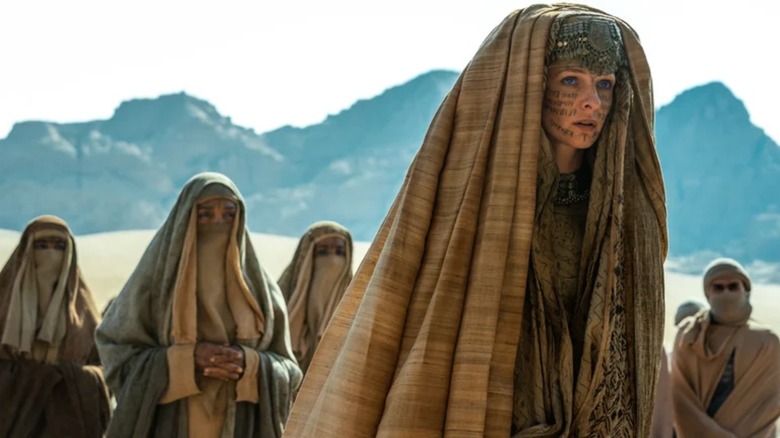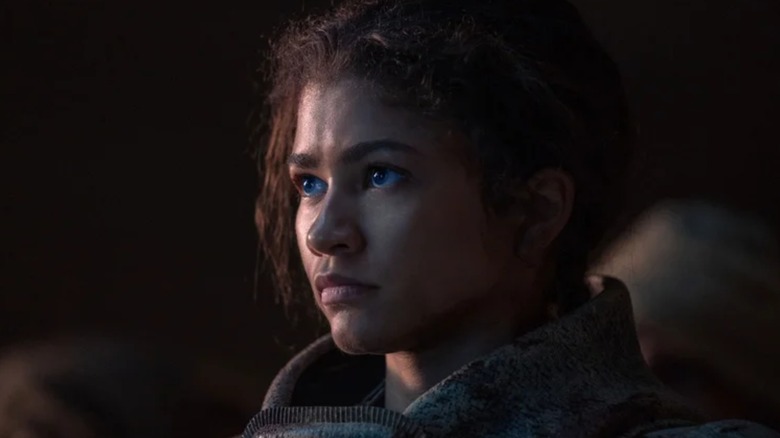Denis Villeneuve's Boiled His Vision For Dune Down Into Just One Word
A third "Dune" movie is in the works from Legendary and director Denis Villeneuve, but it may be a while until it reaches audiences: The Hollywood Reporter recently shared the news that his next film is due in theaters December 2026, and it may not even be a "Dune" sequel. Cinema fans should get excited for any new project from the filmmaker who's also brought us movies like "Blade Runner 2049" and "Arrival," but sci-fi fans understandably can't wait to see the director return to the world of Arrakis.
When Villeneuve's "Dune: Messiah" adaptation does appear, it'll follow a tricky chapter in Frank Herbert's book series. As /Film's Michael Boyle pointed out in a piece written after the third film's announcement, "Dune: Messiah" sidelines one of the franchise's most important characters, Rebecca Ferguson's now-villainous Lady Jessica. "Although Jessica was arguably the co-protagonist of the first book, she spends the entirety of 'Dune: Messiah' chilling back on her home planet of Caladan and (allegedly) hooking up with Gurney Halleck," Boyle writes. She returns for "Children of Dune," but it's far too early to know whether or not Villeneuve will go there with his film series.
Still, a conversation in Tanya Lapointe's book "The Art and Soul of Dune" reveals that the arcs of characters like Jessica, Zendaya's Chani, and Florence Pugh's Princess Irulan have been on Villeneuve's mind since day one. The author relays a note from Eric Roth, who co-wrote the first film's screenplay. Roth said that Villeneuve, "a quiet, thoughtful man," often encouraged him to "be unique and surprising" in his writing. In one of the pair's talks (which began as early as 2017, when Denis was still wrapping up "Blade Runner 2049"), Roth asked Denis for one word to sum up his vision for "Dune."
It's all about women
According to "The Art and Soul of Dune," Denis answered simply: "women." Specifically, he had a lot to say about the mystical sisterhood known as the Bene Gesserit. "Most political movements in the book are driven by men, who are often reacting in the moment," Denis explained. "The Bene Gesserit perceive time differently. They strategize for the long term, thinking in centuries, even millennia. That's how they manipulate the course of humanity." The filmmaker noted that women in the world of "Dune" have "the power of procreation as well as the wisdom to guide humanity to enlightenment."
The filmmaker also contrasts the Bene Gesserit with the male leadership style on display in the "Dune" series, which fans have already seen from such menacing figures as Stellan Skarsgård's Baron Harkonnen, and in "Dune: Part Two," from Timothee Chalamet's Paul Atreides himself. "[Women in 'Dune'] think of future outcomes rather than immediate results," Denis is quoted as saying. "They lead by influence instead of domination." The filmmaker stands by this today: in an interview with Den of Geek in February, he confirmed that "women" was his key word for the adaptation when planning with Roth, and said that he's interested in female-driven modes of power thanks in part to his upbringing "raised in the '60s and '70s in a feminist environment, which is something that I love."
"I want the Bene Gesserit to be at the center of the epicenter of this adaptation," Villeneuve told the outlet. "It's one of the things I feel is the most accurate with our time." So did Villeneuve pull off the women-centric story he'd imagined? You can decide for yourself: "Dune: Part 2" is now available to rent and purchase.

